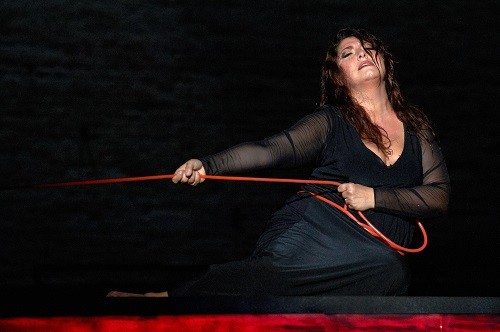 Italy Macerata Opera Festival 1 – Verdi, Il trovatore: Orchestra Regionale delle Marche and Coro Lirico Marchigiano. Conductor, Daniel Oren. Sferisterio di Macerata 12.8.2016. (JB)
Italy Macerata Opera Festival 1 – Verdi, Il trovatore: Orchestra Regionale delle Marche and Coro Lirico Marchigiano. Conductor, Daniel Oren. Sferisterio di Macerata 12.8.2016. (JB)

Cast:
Marco Caria – Conte di Luna
Anna Pirozzi – Leonora
Enkelejeda Shkosa – Azucena
Murat Karahan – Manrico
Alessandro Spina – Ferrando
Production:
Stage Director – Francisco Negrin
Sets and Costumes – Louis Désiré
Lighting – Bruno Poet
Absurdities abound in life almost as much as they do on opera stages. As though to prove the point, I had a Trovatore moment myself around half past midnight, after seeing the opera. The hotel’s night porter called my room, only to have the line disconnected as it was being passed to me. Thinking this might be something important, I called him back, to be told that it was a woman from the foreigners’ registration office who required me to answer some questions. He said she would certainly call back. Hitting the operatic equivalent of top Cs, I told him to tell her that I am not available for frivolities of this kind at this time of day, and to call back after ten the following morning (when I knew I would be out!) [Trio: night porter, bass baritone; Buckley, tenor with chest high Cs; police official, mezzosoprano: andante –allegro agitato.] Verdi would have brought the absurdity to life better than the actual event.
Crime and punishment is at the core of Il trovatore. You might think Dostoevsky handled those twin themes better. But Verdi causes us to better empathize with the Count, Leonora, Azucena, Manrico, much more than the Russian and his cast. And of course, Verdi has music. That’s why we’re at the opera.
The Sferisterio was built in the nineteenth century for a ball game unique to Macerata. Its exaggerated length contrasts with its restricted width, all very suitable for a prison effect, which is right at the core of Trovatore. The presumed crimes and the presumed punishments take on enhanced meaning in the language of bricks and mortar.
Francisco Negrin takes full advantage of this in his staging. I would sometimes have liked a bit more light. But doom and gloom are central to the drama, so I had better shut up about that. In this production the jailor doesn’t even have to let Manrico momentarily out of his prison to acknowledge the applause of the Miserere: we see him atop an extremely high tower, which is more than Leonora can see from stage level.
Piero Pretti, who was to have sung Manrico, was indisposed. But just three-hundred kilometers up the road at the Arena of Verona, the Turkish tenor, Murat Karahan, had arrived ahead of his performance there of this role on 26 August. So he was rushed to Macerata for the Sferisterio’s last performance.
He sounded nervous in Di quella pira. Which tenor doesn’t? But the nervousness gave an appropriate edge to his perfectly intoned, lyrical phrasing. Elsewhere he was admirable, especially in the first scene with Azucena and also with her in the finale. Daniel Oren took this finale slower than advisable, but against the odds, both singers were moving in their delivery. Those odds included a bitterly cold, midnight wind that chilled the entire gathering.
The Albanian mezzosoprano, Enkelejda Shkosa, was as rich-voiced an Azucena as I have ever heard. I enjoyed the steady-voiced intelligence she brought to the role, recalling Shirley Verrett’s. Here was an Azucena you couldn’t mess around with. Verdi’s mezzo-sopranos often steal the show from his sopranos. Just think of Amneris with Aida.
But not so tonight. Anna Pirozzi has just sung Leonora at Covent Garden. She too has a powerful lower register, with the enviable technique of being able to place the high pianissimi with that tricky combination of increased expression and diminished volume. D’amor sull’ali rosee didn’t quite reach Caballé perfection. But it was very close.
Jack Buckley
